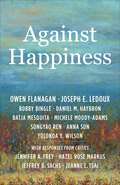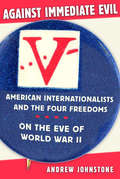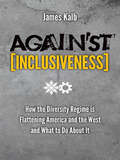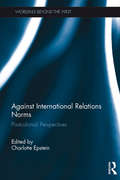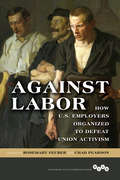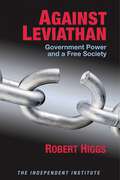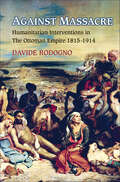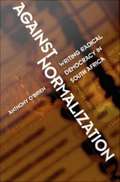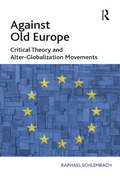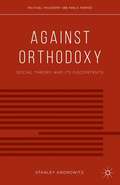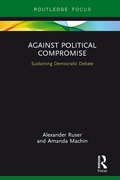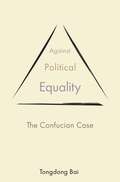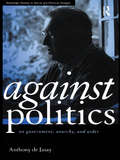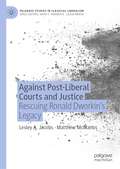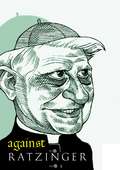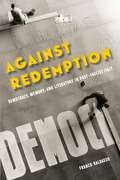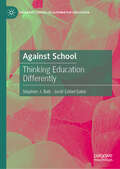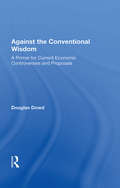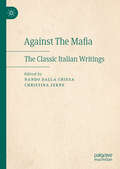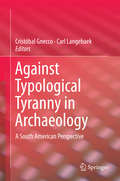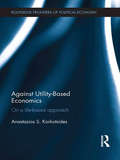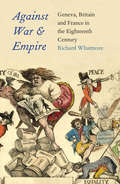- Table View
- List View
Against Happiness
by Owen Flanagan Batja Mesquita Anna Sun Joseph E. LeDoux Daniel M. Haybron Michele Moody-Adams Bobby Bingle Songyao Ren Yolonda Y. WilsonThe “happiness agenda” is a worldwide movement that claims that happiness is the highest good, happiness can be measured, and public policy should promote happiness. Against Happiness is a thorough and powerful critique of this program, revealing the flaws of its concept of happiness and advocating a renewed focus on equality and justice.Written by an interdisciplinary team of authors, this book provides both theoretical and empirical analysis of the limitations of the happiness agenda. The authors emphasize that this movement draws on a parochial, Western-centric philosophical basis and demographic sample. They show that happiness defined as subjective satisfaction or a surplus of positive emotions bears little resemblance to the richer and more nuanced concepts of the good life found in many world traditions. Cross-cultural philosophy, comparative theology, and social and cultural psychology all teach that cultures and subcultures vary in how much value they place on life satisfaction or feeling happy. Furthermore, the ideas promoted by the happiness agenda can compete with rights, justice, sustainability, and equality—and even conceal racial and gender injustice.Against Happiness argues that a better way forward requires integration of cross-cultural philosophical, ethical, and political thought with critical social science. Ultimately, the authors contend, happiness should be a secondary goal—worth pursuing only if it is contingent on the demands of justice.
Against Immediate Evil: American Internationalists and the Four Freedoms on the Eve of World War II
by Andrew JohnstoneIn Against Immediate Evil, Andrew Johnstone tells the story of how internationalist Americans worked between 1938 and 1941 to convince the U.S. government and the American public of the need to stem the rising global tide of fascist aggression. As war approached, the internationalist movement attempted to arouse the nation in order to defeat noninterventionism at home and fascism overseas. Johnstone's examination of this movement undermines the common belief that the Japanese attack on Pearl Harbor wrenched an isolationist United States into global armed conflict and the struggle for international power. Johnstone focuses on three organizations—the American Committee for Non-Participation in Japanese Aggression, the Committee to Defend America by Aiding the Allies, and Fight For Freedom—that actively promoted a more global role for the United States based on a conception of the "four freedoms" later made famous by FDR. The desire to be free from fear was seen in concerns regarding America’s immediate national security. The desire to be free from want was expressed in anxieties over the nation’s future economic prosperity. The need for freedom of speech was represented in concerns over the potential loss of political freedoms. Finally, the need for freedom of worship was seen in the emphasis on religious freedoms and broader fears about the future of Western civilization. These groups and their supporters among the public and within the government characterized the growing global conflict as one between two distinct worlds and in doing so, set the tone of American foreign policy for decades to come.
Against Inclusiveness: How the Diversity Regime is Flattening America and the West and What to Do About It
by James KalbDiversity. Inclusiveness. Equality.--ubiquitous words in 21st-century political and social life. But how do those who police the limits of acceptable discourse employ these as verbal weapons to browbeat their often hapless fellows into having a "real conversation"? How do these terms function as mere doublespeak for the expectation of full-scale capitulation to the views of "right-thinking people"? Those who have long been afraid to touch the issues that attend these words will take great reassurance in an articulate statement of the kind presented in Against Inclusiveness, where the author's approach is sober and extremely well reasoned, as he attempts to marshal truth and fairness as criteria in the examination of issues critical to modern social life. Kalb argues that in current inclusiveness ideology, "classifying people" becomes an exercise of power by the classifier that denies the dignity of the person classified. All rational consideration of human reality is thereby suspended, and the result is something arbitrary and increasingly tyrannical. Against Inclusiveness lays the foundation for what an honest, forthright, real conversation on these matters might look like.
Against International Relations Norms: Postcolonial Perspectives (Worlding Beyond the West)
by Charlotte EpsteinThis volume uses the concept of ‘norms’ to initiate a long overdue conversation between the constructivist and postcolonial scholarships on how to appraise the ordering processes of international politics. Drawing together insights from a broad range of scholars, it evaluates what it means to theorise international politics from a postcolonial perspective, understood not as a unified body of thought or a new ‘-ism’ for IR, but as a ‘situated perspective’ offering ex-centred, post-Eurocentric sites for practices of situated critique. Through in-depth engagements with the norms constructivist scholarship, the contributors expose the theoretical, epistemological and practical erasures that have been implicitly effected by the uncritical adoption of ‘norms’ as the dominant lens for analysing the ideational dynamics of international politics. They show how these are often the very erasures that sustained the workings of colonisation in the first place, whose uneven power relations are thereby further sustained by the study of international politics. The volume makes the case for shifting from a static analysis of ‘norms’ to a dynamic and deeply historical understanding of the drawing of the initial line between the ‘normal’ and the ‘abnormal’ that served to exclude from focus the 'strange' and the unfamiliar that were necessarily brought into play in the encounters between the West and the rest of the world. A timely intervention, it will be of great interest to students and scholars of international relations, international relations theory and postcolonial scholarship.
Against Labor: How U.S. Employers Organized to Defeat Union Activism
by Chad Pearson Rosemary FeurerAgainst Labor highlights the tenacious efforts by employers to organize themselves as a class to contest labor. Ranging across a spectrum of understudied issues, essayists explore employer anti-labor strategies and offer incisive portraits of people and organizations that aggressively opposed unions. Other contributors examine the anti-labor movement against a backdrop of larger forces, such as the intersection of race and ethnicity with anti-labor activity, and anti-unionism in the context of neoliberalism. Timely and revealing, Against Labor deepens our understanding of management history and employer activism and their metamorphic effects on workplace and society. Contributors: Michael Dennis, Elizabeth Esch, Rosemary Feurer, Dolores E. Janiewski, Thomas A. Klug, Chad Pearson, Peter Rachleff, David Roediger, Howard Stanger, and Robert Woodrum.
Against Leviathan: Government Power and a Free Society
by Robert HiggsWhat is fundamentally wrong with government today? In Against Leviathan, economist and historian Robert Higgs, offers an unflinching critical analysis of government power.Against Leviathan combines an economist&’s analytical scrutiny, an historian&’s respect for the facts, and a refusal to accept the standard excuses and cruelties of government officialdom. Topics include Social Security, the paternalism of the FDA, the &“War on Drugs,&” the nature of political leadership, civil liberties, the conduct of the national surveillance state, and governmental responses to a continuing stream of &“crises,&” including domestic economic busts and foreign wars both hot and cold. Against Leviathan is a thorough and penetrating critique, and a significant contribution in this current time of crisis and unchecked expansion of government power.
Against Massacre: Humanitarian Interventions in The Ottoman Empire, 1815–1914 (Human Rights and Crimes Against Humanity #10)
by Davide RodognoAgainst Massacre looks at the rise of humanitarian intervention in the nineteenth century, from the fall of Napoleon to the First World War. Examining the concept from a historical perspective, Davide Rodogno explores the understudied cases of European interventions and noninterventions in the Ottoman Empire and brings a new view to this international practice for the contemporary era. While it is commonly believed that humanitarian interventions are a fairly recent development, Rodogno demonstrates that almost two centuries ago an international community, under the aegis of certain European powers, claimed a moral and political right to intervene in other states' affairs to save strangers from massacre, atrocity, or extermination. On some occasions, these powers acted to protect fellow Christians when allegedly "uncivilized" states, like the Ottoman Empire, violated a "right to life." Exploring the political, legal, and moral status, as well as European perceptions, of the Ottoman Empire, Rodogno investigates the reasons that were put forward to exclude the Ottomans from the so-called Family of Nations. He considers the claims and mixed motives of intervening states for aiding humanity, the relationship between public outcry and state action or inaction, and the bias and selectiveness of governments and campaigners. An original account of humanitarian interventions some two centuries ago, Against Massacre investigates the varied consequences of European involvement in the Ottoman Empire and the lessons that can be learned for similar actions today.
Against Normalization: Writing Radical Democracy in South Africa
by Anthony O'BrienAt the end of apartheid, under pressure from local and transnational capital and the hegemony of Western-style parliamentary democracy, South Africans felt called upon to normalize their conceptions of economics, politics, and culture in line with these Western models. In Against Normalization, however, Anthony O'Brien examines recent South African literature and theoretical debate which take a different line, resisting this neocolonial outcome, and investigating the role of culture in the formation of a more radically democratic society. O'Brien brings together an unusual array of contemporary South African writing: cultural theory and debate, worker poetry, black and white feminist writing, Black Consciousness drama, the letters of exiled writers, and postapartheid fiction and film. Paying subtle attention to well-known figures like Nadine Gordimer, Bessie Head, and Njabulo Ndebele, but also foregrounding less-studied writers like Ingrid de Kok, Nise Malange, Maishe Maponya, and the Zimbabwean Dambudzo Marechera, he reveals in their work the construction of a political aesthetic more radically democratic than the current normalization of nationalism, ballot-box democracy, and liberal humanism in culture could imagine. Juxtaposing his readings of these writers with the theoretical traditions of postcolonial thinkers about race, gender, and nation like Paul Gilroy, bell hooks, and Gayatri Spivak, and with others such as Samuel Beckett and Vaclav Havel, O'Brien adopts a uniquely comparatist and internationalist approach to understanding South African writing and its relationship to the cultural settlement after apartheid. With its appeal to specialists in South African fiction, poetry, history, and politics, to other Africanists, and to those in the fields of colonial, postcolonial, race, and gender studies, Against Normalization will make a significant intervention in the debates about cultural production in the postcolonial areas of global capitalism.
Against Old Europe: Critical Theory and Alter-Globalization Movements
by Raphael SchlembachIn the wake of the Iraq war, the term Old Europe was appropriated by politicians, civil society and social movement actors alike to rally in defence of supposedly social and civilized values against the perceived predatory forces of American finance. Against Old Europe sheds light on the social movement politics encapsulated in the protest slogan 'Fight Old Europe'. Within what is broadly labelled the global justice movement, it explores a particular, radical perspective that warns against the identification with European values by movements resisting neoliberalism. Exploring the work of key theorists critical of globalization, including Habermas, Negri, Holloway, Postone and de Benoist, the book examines critical theory approaches to alter-globalization, illustrated with concrete examples of movements within contemporary Europe. In so doing, it invites readers to explore the charges of nationalism, anti-Americanism and antisemitism brought against parts of the alter-globalization movement. Providing a new perspective on critiques of globalization, Against Old Europe will appeal to sociologists and social and political theorists studying social movements, anti-globalization activism and European politics and identity.
Against Orthodoxy
by Stanley AronowitzIn Against Orthodoxy, the author engages some of the most provocative thinkers of the twentieth century, including Georg Lukacs, Antonio Gramsci, Herbert Marcuse, Karl Marx, Harry Braverman and Paulo Freire. All of these social and political theorists were dedicated to fundamental social change, but many were forced to recognize the difficulty of achieving change in the modern world. This book demonstrates that all of them reject conventional interpretations of how radical change mightbe possible. What marks their unity is an effort to address capitalism's ability to incorporate widespread popular alienation. Consequently they urge serious attention to issues of culture, subjectivity, and education.
Against Perfectionism
by Steven LecceIn a democracy, political authority should be determined independently of religious, philosophical, and ethical ideals that often divide us. This idea, called liberal neutrality, challenges one of the oldest insights of the Western philosophical tradition in politics. At least since Plato, the concept of perfectionism has insisted that statecraft is akin to "soulcraft," and political questions about the justification of state power have followed from ethical questions about what is valuable in life and about how we should live if we are to live well. Against Perfectionism defends neutralist liberalism as the most appropriate political morality for democratic societies. Steven Lecce investigates the theoretical foundations of liberalism, bringing together classic and contemporary arguments about the implications of pluralism for liberal equality. He surveys three classic debates over the grounds and limits of tolerance, and investigates the limits of perfectionism as a guide to law and public policy in pluralist societies. Lecce ultimately suggests a version of neutrality that answers the critiques recently leveled against it as a political ideal. Presenting sophisticated and groundbreaking arguments, Against Perfectionism is a call to rethink current concepts of law and public policy in democratic societies.
Against Political Compromise: Sustaining Democratic Debate
by Alexander Ruser Amanda MachinPolitical compromise is emerging as a preferred solution for numerous apparently intractable problems. Many have pointed to the rising degree of political polarisation around issues such as climate change, immigration and abortion. These are ‘wicked problems’ that are clearly not conducive to any sort of political consensus. The groups and individuals who are party to these issues disagree, often both fully and fiercely. As an alternative, political compromise seemingly offers a way of respecting difference while simultaneously generating a decision upon which policy can move forward. But proponents of political compromise should also acknowledge its significant weaknesses and dangers. Invoking recent examples from various policy areas to illustrate their claims, the authors assert that compromise can disguise inequality, reduce plurality and heighten uncertainty. In short, compromise can weaken democracy and must not be seen as some sort of political panacea. This concise, accessible text offers a strong and provocative argument that provides a crucial counterpoint to the promise of compromise. It should prove of interest to students and scholars interested in compromise and consensus as well as democratic governance, social inequality, political apathy and environmental politics.
Against Political Equality: The Confucian Case (The Princeton-China Series #10)
by Tongdong BaiWhat might a viable political alternative to liberal democracy look like? In Against Political Equality, Tongdong Bai offers a possibility inspired by Confucian ideas.Bai argues that domestic governance influenced by Confucianism can embrace the liberal aspects of democracy along with the democratic ideas of equal opportunities and governmental accountability to the people. But Confucianism would give more political decision-making power to those with the moral, practical, and intellectual capabilities of caring for the people. While most democratic thinkers still focus on strengthening equality to cure the ills of democracy, the proposed hybrid regime—made up of Confucian-inspired meritocratic characteristics combined with democratic elements and a quasi-liberal system of laws and rights—recognizes that egalitarian qualities sometimes conflict with good governance and the protection of liberties, and defends liberal aspects by restricting democratic ones. Bai applies his views to the international realm by supporting a hierarchical order based on how humane each state is toward its own and other peoples, and on the principle of international interventions whereby humane responsibilities override sovereignty.Exploring the deficiencies posed by many liberal democracies, Against Political Equality presents a novel Confucian-engendered alternative for solving today’s political problems.
Against Politics: On Government, Anarchy and Order (Routledge Studies in Social and Political Thought)
by Anthony De JasayIs the state a necessity, a convenience, or neither? It enforces collective choices in which some override the preferences and dispose of the resources of others. Moreover, collective choice serves as its own source of authority and preempts the space it wishes to occupy. The morality and efficacy of the result are perennial questions central to political philosophy.In Against Politics Jasay takes a closely reasoned stand, based on modern rational choice arguments, for rejecting much of mainstream thought about these matters. In the first part of the book, Excuses, he assesses the standard justification of government based consent, the power of constitutions to achieve limited government, and ideas for reforming politics. In the second part, Emergent Solutions , he explores the force of first principles to secure liberties and rights and some of the potential of spontaneous conventions for generating ordered anarchy.Written with clarity and simplicity, this powerful volume represents the central part of Jasay's recent work. Fully accessible to the general reader, it should stimulate the specialist reader to fresh thought.
Against Post-Liberal Courts and Justice: Rescuing Ronald Dworkin’s Legacy (Palgrave Studies in Classical Liberalism)
by Lesley A. Jacobs Matthew McManusThis book covers how Liberal institutions – constitutional democracy, economic markets, liberal courts, free trade, international human rights – around the world are under assault by the political right and we are witnessing the emergence of post-liberal institutions. These post-liberal institutions are founded on the core conviction that the actions of liberal institutions including the United States Supreme Court are patently unjust. This volume makes the case against post-liberal courts and justice by reconnecting to the principles of moral equality and dignified freedom for all. The intention is to show how there is great untapped potential in the work of Ronald Dworkin’s work to demonstrate that it can help progressive liberals think through the great issues of the day and respond to the contemporary criticisms of the political right. The core themes are concretely illustrated by focusing on some of the most controversial recent post-liberal decisions of the Supreme Court, ranging from election funding to abortion to race-sensitive affirmative action, to economic inequality in an age of increasingly unequal opportunities.
Against Ratzinger
by Antony ShugaarPublished anonymously in Italy on the one-year anniversary of Ratzinger's election to the papacy, Against Ratzinger caused a national stir and immediately shot onto bestseller lists. Now America, the home of over 67 million Catholics, will have the opportunity to wrestle with this insightful and revealing examination of Pope Benedict XVI. This concise volume analyzes and critiques the pronouncements of Ratzinger. Addressing some of the most dramatic and pressing issues of our time, Against Ratzigner studies the Pope's responses to birth control, abortion, and sexual abuse in the Church. Against Ratzinger charts Ratzinger's rise to power from his arrival in Rome in 1981 and addresses his close relationship with the late Pope John Paul II.
Against Redemption: Democracy, Memory, and Literature in Post-Fascist Italy (World War II: The Global, Human, and Ethical Dimension)
by Franco BaldassoWINNER, HELEN AND HOWARD R. MARRARO PRIZE IN ITALIAN HISTORYDiscloses the richness of ideas and sheds light on the controversy that characterized the transition from fascism to democracy, examining authors, works and memories that were subsequently silenced by Cold War politics.How a shared memory of Fascism and its cultural heritage took shape is still today the most disputed question of modern Italy, crossing the boundaries between academic and public discourse. Against Redemption concentrates on the historical period in which disagreement was at its highest: the transition between the downfall of Mussolini in July 1943 and the victory of the Christian Democrats over the Left in the 1948 general elections. By dispelling the silence around the range of opinion in the years before the ideological struggle fossilized into Cold War oppositions, this book points to early postwar literary practices as the main vehicle for intellectual dissent, shedding new light on the role of cultural policies in institutionalizing collective memory. During Italy’s transition to democracy, competing narratives over the recent traumatic past emerged and crystallized, depicting the country’s break with Mussolini’s regime as a political and personal redemption from its politics of exclusion and unrestrained use of violence. Conversely, outstanding authors such as Elsa Morante, Carlo Levi, Alberto Moravia, and Curzio Malaparte, in close dialogue with remarkable but now-neglected figures, stressed the cultural continuity between the new democracy and Fascism, igniting heated debates from opposite political standpoints. Their works addressed questions such as the working through of national defeat, Italian responsibility in World War II, and the Holocaust, revealing how the social, racial, and gender biases that characterized Fascism survived after its demise and haunted the newborn democracy.
Against Reform
by John PepallIn Against Reform, John Pepall offers a stringent critique of proposed reforms to Canada's political institutions. Examining electoral reform, an elected or provincially appointed Senate and reduced terms for Senators, fixed election dates, recall, initiative, and parliamentary reform, including 'free votes' and parliamentary confirmation of appointments, Pepall contends that these reforms are ill-conceived and would be harmful.At the root of Pepall's critique is an argument that, in Canada today, too many voters are quick to blame institutions rather than their own conflicting interests and understandings when they do not receive what they want out of government. While considering influential factors such as academic and media bias, political fashion, and the American example, Pepall's unique and highly readable assessment takes aim at the practical and theoretical understandings of reform across party lines.
Against School: Thinking Education Differently (Palgrave Studies in Alternative Education)
by Stephen J. Ball Jordi Collet-SabéThis book invites the reader to think education against, beyond and without the school and its paraphernalia. To think about &‘education&’, rather than schooling, and what kind of education is relevant to and needed now in the complex, difficult and dangerous world we live in. That invitation means testing our limits, questioning and changing ourselves and thinking the practice of education differently. The book is not about tinkering, improving, reforming – it about clearing away the detritus of the school and using the space created to explore education as self-formation and commoning. It will be of interest to scholars and graduate students of alternative education, schooling, educational policy and philosophy, and the sociology of education.
Against Security: How We Go Wrong at Airports, Subways, and Other Sites of Ambiguous Danger - Updated Edition
by Harvey MolotchHow security procedures could be positive, safe, and effectiveThe inspections we put up with at airport gates and the endless warnings we get at train stations, on buses, and all the rest are the way we encounter the vast apparatus of U.S. security. Like the wars fought in its name, these measures are supposed to make us safer in a post-9/11 world. But do they? Against Security explains how these regimes of command-and-control not only annoy and intimidate but are counterproductive. Sociologist Harvey Molotch takes us through the sites, the gizmos, and the politics to urge greater trust in basic citizen capacities—along with smarter design of public spaces. In a new preface, he discusses abatement of panic and what the NSA leaks reveal about the real holes in our security.
Against The Conventional Wisdom: A Primer For Current Economic Controversies And Proposals
by Douglas DowdFor the past twenty-five years, the United States has undergone a retrogression in its socioeconomic policies–facilitated and supported by most economists–thanks to the steady drumbeat of arguments by entrepreneurs and politicians who celebrate the free market for anything and everything and who advocate, among other follies, balanced budgets and r
Against The Mafia: The Classic Italian Writings
by Nando Dalla Chiesa Christina JerneThis collection of classic texts offers a longitudinal overview of the Italian mafia through the eyes of those who have questioned it in the past 144 years. It presents English translations of the key works of, among others, judges (Giovanni Falcone), political theorists (Gaetano Mosca), trade unionists (Pio La Torre), journalists (Giuseppe Fava), generals (Carlo Alberto Dalla Chiesa), and priests (Don Diana). These critical voices have been foundational to shaping the way Italian culture, policies and legislation relate to the mafia phenomenon. They represent different political standpoints, from elitism to communism, as well as vastly different times, from post-feudalism to hyper globalization. This book offers a rare (and hitherto untranslated) insight into, not only the history of the Italian mafia and its conceptualizations, but also into the movement against the mafia, which is one of the longest lasting (and most unrecognized) European social movements. It provides a usefulhistorical archive of Italian political and sociological thought and a diversity of perspectives through which to tackle a complex and increasingly global criminological issue, making it relevant for those interested in Italian studies, political theory, sociology, criminology, legal studies, and history.
Against Typological Tyranny in Archaeology: A South American Perspective
by Cristóbal Gnecco Carl LangebaekThe papers in this book question the tyranny of typological thinking in archaeology through case studies from various South American countries (Venezuela, Colombia, Bolivia, Argentina, and Brazil) and Antarctica. They aim to show that typologies are unavoidable (they are, after all, the way to create networks that give meanings to symbols) but that their tyranny can be overcome if they are used from a critical, heuristic and non-prescriptive stance: critical because the complacent attitude towards their tyranny is replaced by a militant stance against it; heuristic because they are used as means to reach alternative and suggestive interpretations but not as ultimate and definite destinies; and non-prescriptive because instead of using them as threads to follow they are rather used as constitutive parts of more complex and connective fabrics. The papers included in the book are diverse in temporal and locational terms. They cover from so called Formative societies in lowland Venezuela to Inca-related ones in Bolivia; from the coastal shell middens of Brazil to the megalithic sculptors of SW Colombia. Yet, the papers are related. They have in common their shared rejection of established, naturalized typologies that constrain the way archaeologists see, forcing their interpretations into well known and predictable conclusions. Their imaginative interpretative proposals flee from the secure comfort of venerable typologies, many suspicious because of their association with colonial political narratives. Instead, the authors propose novel ways of dealing with archaeological data.
Against Utility-Based Economics: On a Life-Based Approach (Routledge Frontiers of Political Economy)
by Anastasios S. KorkotsidesUtility-based theory and the fallback choice-theoretic framework are shown to be biased, irremediably flawed and misleading. A radically different theory of value and of consumer behaviour is proposed based on existential interpretations of scarcity, value and self-interest. For self-conscious mortals, only time is scarce. All other is derivative scarcity. Value is in the life, as a knowledge extract of time, which goes into commodities as direct human labour and depreciated capital, through their production. By structuring their preferences, consumers try to confiscate more of such value per unit of expended income, extending their social presence, soothing their angst and gaining power over each other. This raises output and makes gains cancel out. Negative psychological externalities preclude any well-being or social-welfare type conclusion. These resolve a number of long-standing issues: endogenously generated growth, the micro-macro connection, the price mechanism, crises, unemployment, etc. Equilibrium is of a low-potential kind, not of a force-balancing one, and it is unique, reachable and stable. The relevant analytics involve purely economic, non-psychological entities. Consumer behaviour is grounded on a well-defined, structure-based decision criterion and on observably measurable magnitudes, only. The social ramifications of the two juxtaposed perspectives are discussed at length.
Against War and Empire
by Richard WhatmoreAs Britain and France became more powerful during the eighteenth century, small states such as Geneva could no longer stand militarily against these commercial monarchies. Furthermore, many Genevans felt that they were being drawn into a corrupt commercial world dominated by amoral aristocrats dedicated to the unprincipled pursuit of wealth. In this book Richard Whatmore presents an intellectual history of republicans who strove to ensure Geneva’s survival as an independent state. Whatmore shows how the Genevan republicans grappled with the ideas of Rousseau, Voltaire, Bentham, and others in seeking to make modern Europe safe for small states, by vanquishing the threats presented by war and by empire.
